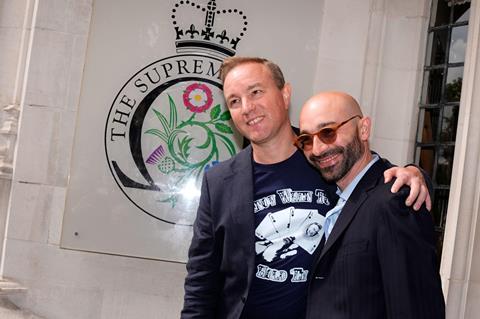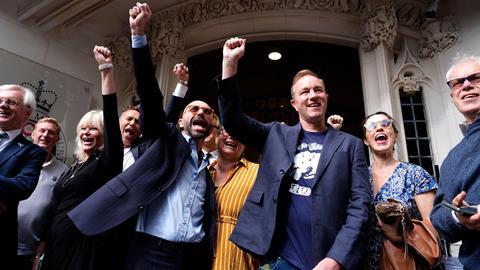Supreme Court justices today unanimously quashed the fraud convictions of two former City traders, finding their trial judges’ directions to the juries were ‘inaccurate and unfair’.
Tom Hayes and Carlo Palombo’s convictions were referred to the Court of Appeal by the Criminal Cases Review Commission in 2023 following a US Court of Appeal decision clearing two other traders convicted in 2022. Outstanding charges against Hayes in the US were also dropped.
The Court of Appeal dismissed the appeals last year but certified that its decision involved a point of law of general public importance relating to the proper definition of the London Inter-Bank Offered Rate (LIBOR) and Euro Interbank Offered Rate (EURIBOR). LIBOR, which was phased out in 2023, and EURIBOR are benchmark interest rates for short-term loans between banks. The IBOR rates were calculated daily from submissions by a panel of major banks.
Hayes, 45, a former securities trader at UBS and Citigroup, was convicted in 2015 of multiple charges of conspiracy to defraud in relation to manipulations of the LIBOR. He was sentenced to 14 years’ imprisonment, later reduced to 11 years. He has always maintained his innocence.
Palombo, 46, was convicted of conspiracy to defraud by rigging the EURIBOR benchmark interest rate between 2005 and 2009. He was sentenced to four years’ imprisonment following a 2019 trial at Southwark Crown Court.

Referring to Hayes’ case, Lord Leggatt, with whom Lord Reed, Lord Hodge, Lord Lloyd-Jones and Lady Simler agreed, said: ‘Regrettably the indictment did not give sufficient particulars to enable the defence and the trial judge to know clearly and precisely the nature of the prosecution’s case. Had it done so, the problems which have beset this case might have been avoided.’
The Supreme Court said the CoA was wrong to reject the ‘previously uncontroversial proposition that a LIBOR or EURIBOR submission typically involved a selection from within a range of borrowing rates’.
Read more
The judgment added that ‘it was when at the end of Mr Hayes’ trial the judge came to direct the jury on the law that, in my opinion, the case took a wrong turn’. It said: ‘The wording of the question certified for this appeal assumes that it was appropriate to direct the jury – as the judge did at length – about what, as a matter of law upon its proper construction, the LIBOR definition required. In my view, that assumption is mistaken.’
The issue at Hayes’ trial ‘turned on how the person answering the [LIBOR] question understood it and believed that the answer given would be understood’ which was ‘a matter of fact for the jury to consider’ and not a matter of law for the court. The premise on which the trial judge directed the jury was ‘misconceived’.
The judge’s directions which ‘conflated the question whether the submission of a rate complied with the LIBOR definition with the question whether it represented the genuine opinion of the submitter…usurped the jury’s function and undermined the fairness of the trial’.
Quashing Hayes' conviction, the judgment said: ‘It is not possible to say that, if the jury had been properly directed, they would have been bound to return verdicts of guilty. The convictions are therefore unsafe and cannot stand.’
Palombo’s conviction was also quashed. The judgment said: ‘When the flaws in the directions given at Mr Palombo’s trial are considered in combination, it cannot safely be assumed that, without them, the jury would still have been bound to convict Mr Palombo. Thus, his conviction also cannot stand.’
A spokesperson for the SFO said: 'We have considered this judgment and the full circumstances carefully and determined it would not be in the public interest for us to seek a retrial.'
This article is now closed for comment.






























16 Readers' comments